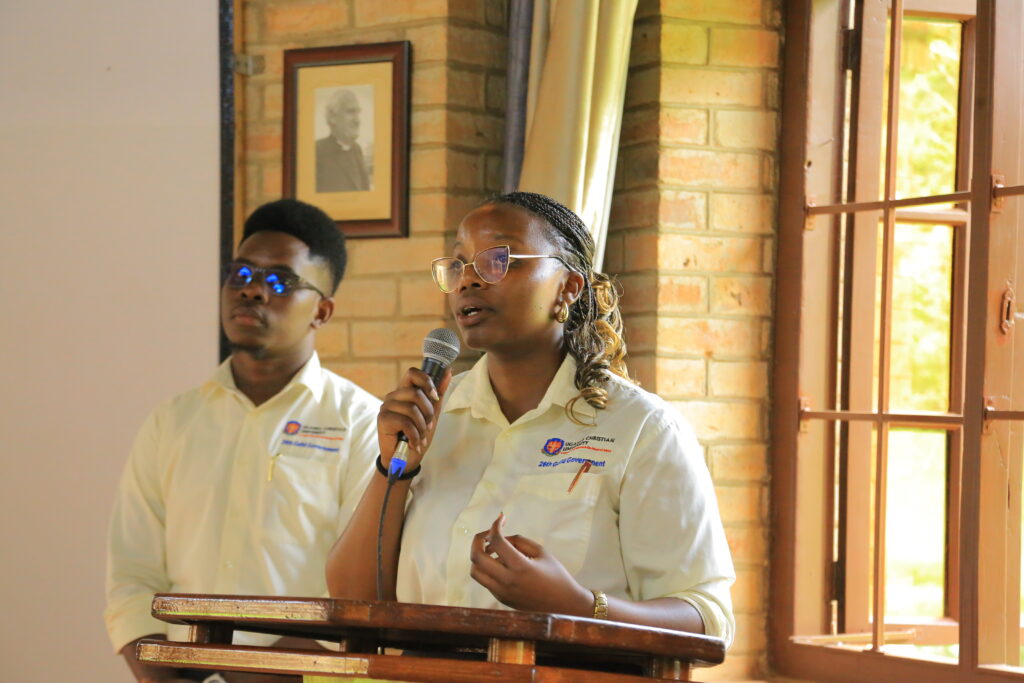By Bill Dan Arnold Borodi
Agira Birungi became the 26th Guild President of Uganda Christian University (UCU) after a closely contested election on November 15, 2023. She was sworn into office on November 21, where she committed to fulfilling a manifesto that she launched on 14th November. Looking back at the past year, did her government deliver what she had set out for it to do? We take a look.
On inclusivity
The administration slogan was “Inclusivity in Action” and one of their goals was to create inclusivity. Nobert Acaye, the Deputy Minister of Communications and Public Relations for the government believes that inclusivity was evident in events like the International Students’ Gala, which he hailed as the best in UCU’s history.
However, some students expressed feelings of disconnection from guild activities.
Nolan Rugaba from the School of Business said for the short time he has been on campus, he is not aware of the guild government’s activities..
But, Abraham Elomaboni, a class representative from the School of Law, believes that the government tried its best to engage with different students pointing at events like the inter-faculty exhibitions. “The government only partially achieved its manifesto,” he states.
On accountability
Agira had also pledged to enhance accountability by increasing guild assemblies from two to three per term. The third assembly intended to provide comprehensive reports to students. However, according to Acaye, only one guild assembly was held during her tenure due to time constraints and poor planning.
That said, Acaye believes they did their best to provide accountability. “All leaders were required to submit accountability reports through the Ministry of Finance, which they have done,” he says. Their accountability was however tested when issues regarding guild funds arose in connection to the office of the prime Minister after the Guild run.
On this Acaye said, “We only had one corruption scandal with the office of the Prime Minister,” he stated. “The government through the tribunal delivered a verdict, the victim appealed the decision of the tribunal and it’s now with the school management,” he adds.
According to Alexdaria Adwet who was welfare Minister, “Most of the things that were budgeted for were achieved.” She believes that their achievements were not seen because of a lot of negativity.
“People didn’t like us, they wouldn’t see our work. Instead of appreciating the little we were doing they focused on our negatives only,” she said.
Elomaboni however believes the government lost the trust of both the student community and administration. “The government has lost trust, not only the 26th government but even previous governments contributed to this,” he said, citing the corruption scandal and pointing to a memo from the office of the Vice Chancellor as testament to this.“I hope you are aware of a memo from the office of the VC that was shared on centralization of funds from fundraisings,” he adds.
On security
On security matters, Agira pledged to implement sign-in/out protocols for residence halls and hold consultations with hostel owners. While these measures were not fully realised according to Acaye, the government worked closely with the Magnum security company to enhance safety. “We have made sure a security guard is present at all entrances,” he said.
Security meetings with different hostel custodians led to improved lighting at hostel gates and better monitoring of student lifestyles. Acaye says that thefts still exist but they have reduced.
Elomaboni agrees saying that he had an experience with his class when his classmates lost phones and the guild government responded to the issue and brought the culprits to book.
Tuition challenges
Addressing tuition challenges was one of Agira’s goals. Her administration sought to increase tuition funds through partnerships and by allowing student businesses on campus.
Even as they tried to do this, tensions arose over tuition policy regarding coursework payments from last semester when students who were unable to pay 75% of tuition were initially barred from completing their coursework. According to Acaye, “After negotiations with university administration, a grace period was granted for students to clear their balances”. Much as Acaye attributes the grace period to negotiations, Elomaboni believes that the policy was relaxed due to public demand.
“The Vice President reached out to the VC to negotiate in vain, but late -on, due to public demand, it was relaxed for 2 to 3 days for everyone to complete tuition,” he argues.
Overall, Elomaboni commends the government for sustaining projects initiated by previous administrations. “This is very important,” he emphasised.
Elomaboni attributes the challenges faced by the government during their term to a number of factors.“What I have discovered is that most of the student leaders, not only the guild aspirants but the MPs, usually include in their manifesto what is out of their power.”
He insists that leaders should understand the reality of the university, and the system well. “This is a private university with decision makers and for a decision to be made, it takes processes,” he said.
The Director of Student Affairs, Pamela Tumwebaze, praised Agira’s government for its inclusivity efforts and conflict resolution skills. “They didn’t stick to tradition; they tried to bring in unifying factors,” she said. “They did a good job, even how they handled the few conflicts they got. They handled it in a mature way, which is what leaders should do,” she adds.
As the 27th guild government embarks on her term of office, Agira’s tenure serves as a valuable learning experience for the government. The administration will need to build on her successes while addressing lingering challenges to restore trust among students and university authorities alike.


